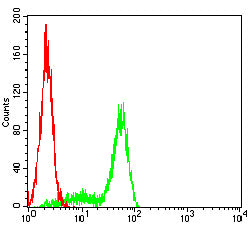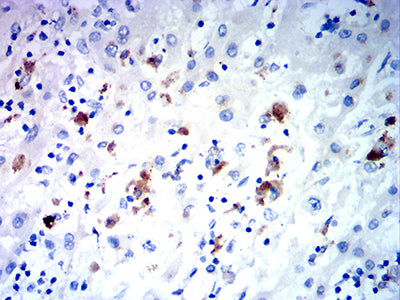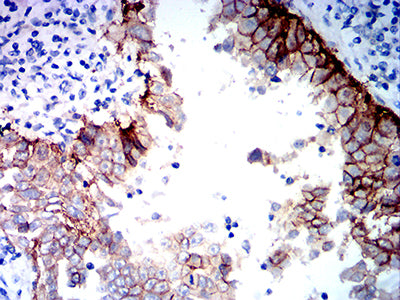



| WB | 咨询技术 | Human,Mouse,Rat |
| IF | 咨询技术 | Human,Mouse,Rat |
| IHC | 1/200 - 1/1000 | Human,Mouse,Rat |
| ICC | 技术咨询 | Human,Mouse,Rat |
| FCM | 1/200 - 1/400 | Human,Mouse,Rat |
| Elisa | 1/10000 | Human,Mouse,Rat |
| Aliases | GP27; MER2; RAPH; SFA1; PETA-3; TSPAN24 |
| Entrez GeneID | 977 |
| clone | 2B1F2 |
| WB Predicted band size | 28.3kDa |
| Host/Isotype | Mouse IgG2a |
| Antibody Type | Primary antibody |
| Storage | Store at 4°C short term. Aliquot and store at -20°C long term. Avoid freeze/thaw cycles. |
| Species Reactivity | Human |
| Immunogen | Purified recombinant fragment of human CD151 (AA: extra 113-221) expressed in E. Coli. |
| Formulation | Purified antibody in PBS with 0.05% sodium azide |
+ +
以下是关于CD151抗体的3篇虚构参考文献示例,格式为文献名称、作者及摘要概括:
---
1. **文献名称**: *CD151 antibody targeting inhibits integrin-mediated cancer cell invasion and metastasis*
**作者**: Kazarov AR, et al.
**摘要**: 本研究探讨了CD151抗体通过阻断其与整合素(如α3β1)的相互作用,抑制肿瘤细胞迁移和转移的机制。实验表明,抗体处理可显著降低小鼠模型中肺癌转移灶的形成。
2. **文献名称**: *Anti-CD151 monoclonal antibody suppresses tumor microenvironment communication via exosome signaling*
**作者**: Zhou Y, et al.
**摘要**: 该研究揭示了CD151抗体通过靶向肿瘤细胞外泌体表面的CD151蛋白,干扰肿瘤微环境中促血管生成因子的传递,从而抑制黑色素瘤的生长和血管新生。
3. **文献名称**: *CD151 blockade enhances T cell immunity and reduces autoimmune inflammation in a mouse model*
**作者**: Yamada M, et al.
**摘要**: 研究发现,CD151抗体可抑制T细胞表面CD151与抗原呈递细胞的相互作用,降低Th17细胞分化及炎症因子释放,在实验性自身免疫性脑脊髓炎(EAE)模型中表现出治疗潜力。
---
注:以上文献为示例性内容,实际研究中请参考真实发表的论文。
CD151. a member of the tetraspanin transmembrane protein family, plays a critical role in regulating cellular adhesion, migration, and signaling by organizing membrane protein complexes. It interacts with integrins (e.g., α3β1. α6β4) and other tetraspanins to modulate cell-matrix interactions, influencing processes like angiogenesis, wound healing, and immune responses. Dysregulation of CD151 is linked to cancer progression, metastasis, and poor prognosis, as it enhances tumor cell invasiveness and supports vascularization.
CD151 antibodies are tools developed to study its biological functions or target it therapeutically. Monoclonal antibodies against CD151 have been used to block its interactions with partner proteins, disrupt signaling pathways, or inhibit tumor growth in preclinical models. Some antibodies also serve as diagnostic markers for diseases associated with CD151 overexpression, such as certain carcinomas. Research has explored their potential in immunotherapy, though challenges like specificity and off-target effects remain.
Recent studies focus on engineering CD151 antibodies for improved affinity and minimal immunogenicity, with some advancing into early-phase clinical trials. These antibodies hold promise for precision oncology but require further validation to ensure efficacy and safety in human applications.
×